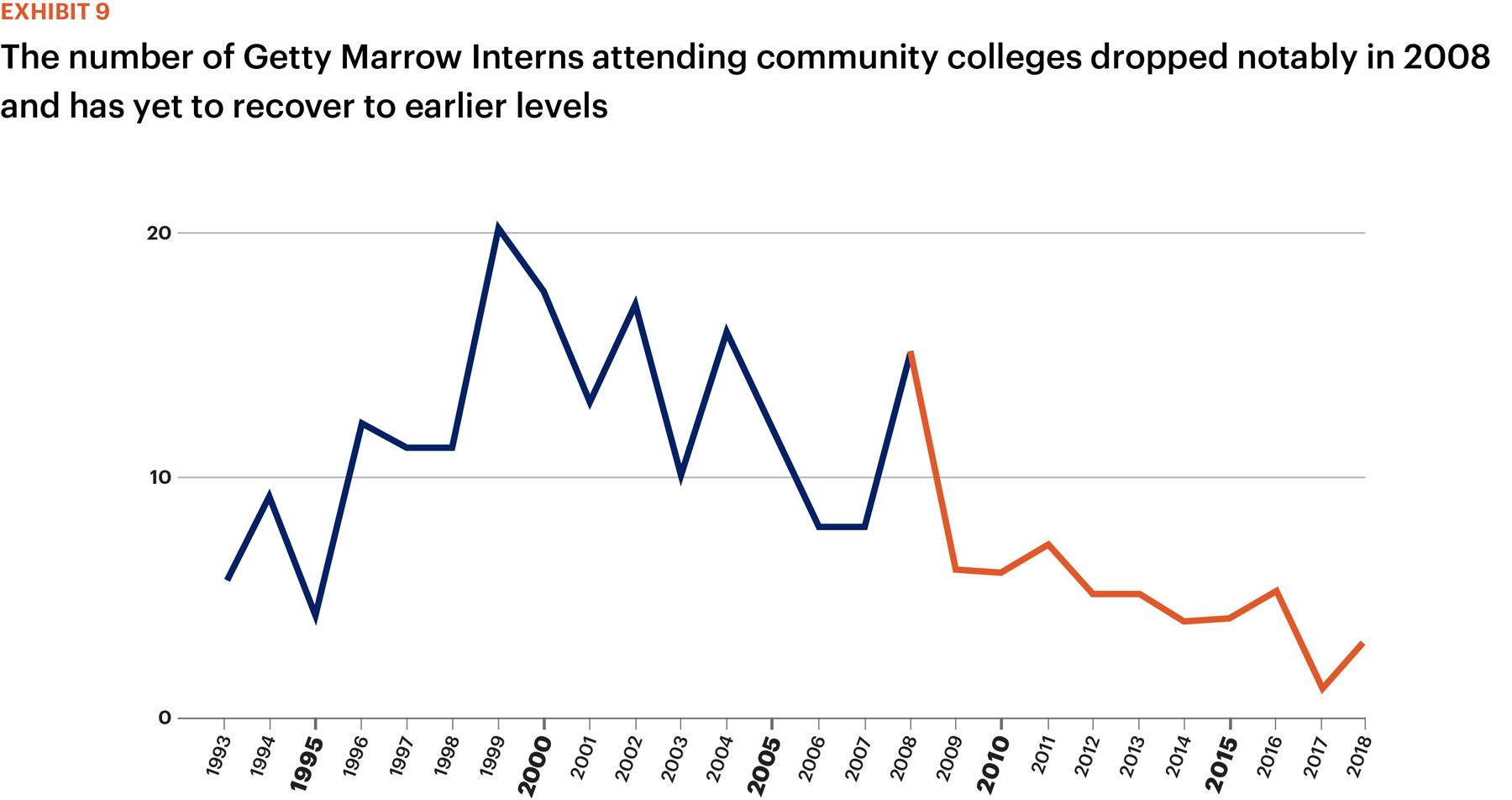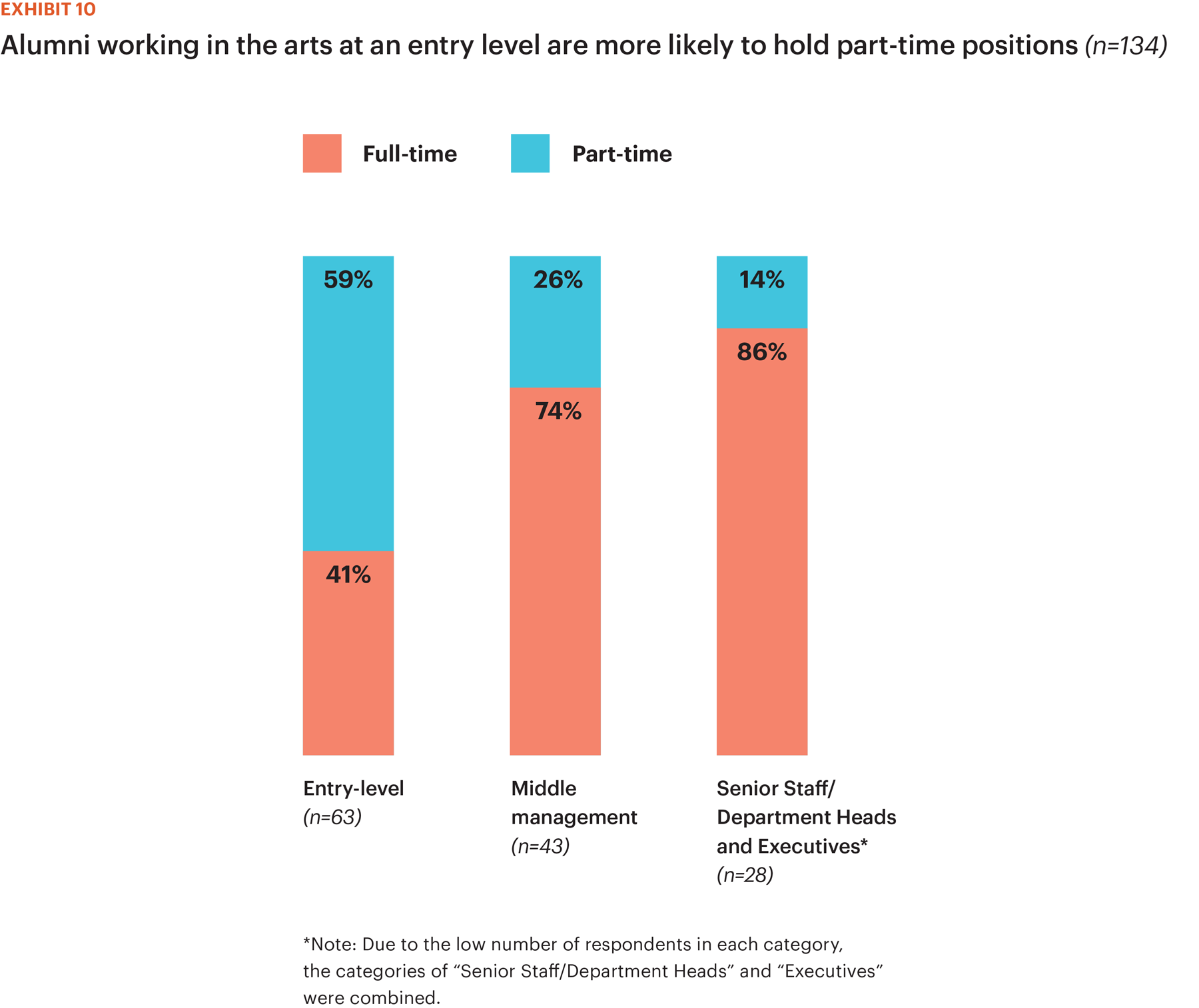Areas to Improve
Data presented in the previous sections suggest that the Getty Foundation has developed an effective internship model to contribute to making the arts workforce more diverse, yet the continuing lack of diversity in the field overall is still a deeply challenging issue that requires even more attention and investment. In terms of next steps, survey data and interview feedback suggest that more purposeful interventions for the most statistically underrepresented groups, greater focus on workplace inclusion as part of the internship experience, and increased career-development support for interns and alumni, particularly in the early stages of their careers, are crucial areas to pursue in order to improve the program.
Post-internship support can focus more on African American alumni
As discussed earlier in the report, interns represent a range of racial and ethnic groups present throughout Los Angeles County. However, not all alumni from each group go on to work in the arts at the same rate. According to the 2019 survey, individuals who self-identified as African American are less likely to be working in the arts than the group as a whole and in comparison to individuals who identified with other groups such as Latino/Hispanic and Asian. Only 21% of this alumni group held jobs in the field at the time of the survey. Although the small number of African American respondents in the survey sample make it difficult to draw conclusions, survey results generally indicate that African American alumni working in the arts are less likely to report a sense of belonging to a network of peers as a result of their internships (44%) compared to other alumni working in the field (80%). Survey findings also point to possible solutions to these problems. African American alumni working in the field identified “job search skills” and “mentoring” as the most desired areas for support. The Getty Foundation is using these findings to develop more post-internship assistance.
Recruitment efforts can bolster equity and accessibility
As mentioned in the program model section of this report, Getty Marrow interns attend a wide variety of undergraduate institutions, both public and private, large and small. However, from 2009 onward there has been a noticeable decrease in alumni attending community colleges at the time of their internship (see Exhibit 9). A 60% reduction occurred from 2008 to 2009 and rates have changed little since then.
Foundation staff recognize that California’s community colleges are among the most diverse and cost-effective in the nation. Increased recruitment from these populations can be a positive step in promoting greater socioeconomic accessibility and representation in the internship program.
Getty and its partners can more deliberately acknowledge the effects of systemic racism
Despite the internship program’s focus on promoting diversity in the arts, alumni report that they rarely engaged in conversations about diversity during their internships. Many alumni noted that conversations about diversity, equity, and inclusion in the arts came up mostly outside of their host organizations in Getty-sponsored programming. About one-third of interview participants did not recall diversity being discussed at all where they interned. These findings are consistent across generations with no discernible differences between recent interns and participants from several years ago.
“There was never really an acknowledgement of why it’s important that the museum I was working at was taking part in this program.” Getty Marrow Alum
This gap suggests an opportunity to encourage dialogue about the program’s goal to diversify museums and arts organizations, should interns want to engage in such discussions. Getty Foundation has already taken one concrete step by offering anti-racism workshops to supervisors and interns during the summer of 2020. Participants reported high degrees of satisfaction with the workshops, and the Foundation will continue to look for other ways to provide interns and supervisors with resources to engage with these issues.
Supervisors can be trained in culturally responsive mentoring
Cultural responsiveness is an increasingly common methodology in the education sector that refers to the ability to learn from and relate respectfully to a variety of cultures outside of one’s own. Alumni brought up the concept as a way to address their difficulty in finding mentors who are people of color. Increasing cultural responsiveness among host organizations and supervisors is also a way to combat the challenges of racism that persist throughout the arts sector. Several alumni recounted stories of experiencing racist micro-aggressions such as “someone asking for my badge or being asked if I worked in the cafeteria” during their internships. “Being culturally inclusive and culturally responsive would improve the dynamic,” noted an alum who reported being the only departmental person of color during the internship. In response to this finding, the Foundation is now incorporating culturally responsive mentoring into its supervisor training activities and materials.
Early-career alumni could use help with job transitions
Many of the alumni interviewed mentioned holding multiple part-time positions at the start of their careers to get a foot in the door. Overall, a third of alumni currently working in the field hold part-time positions. The majority of those working entry-level positions are working part time (see Exhibit 10). These findings point to a vulnerability among those who recently entered the arts field, as well as a reality that many in this early-career stage are switching jobs. As one alum put it, “Most arts organizations tend to be small and the ability to take on a higher paying or more interesting position tends to be by switching employers.”
Job movement rates among Getty Marrow alumni support this observation. Seventy-eight percent of alumni in entry-level jobs worked at their previous jobs for two years or less. Given that those working in entry-level positions are the largest segment of alumni working in the arts (47% in 2019, per Exhibit 4 in “Program Impact”), Getty could deepen its career development support to help these individuals who want to work in the arts thrive. Data from the summer 2020 pandemic survey showed that “resume workshops” and “job search training” are among the top professional development services that alumni in the arts would most like for Getty to provide.
Alumni want more opportunities to develop professional networks
Enhanced professional networks are one of the most valuable parts of the internship for many alumni. Although the Getty Foundation offers multiple networking events, alumni are eager for more opportunities to connect. Alumni mentioned the benefits of a range of events including larger, more structured gatherings as well as smaller, specialized networking opportunities. Since 2010, the Getty Foundation has consistently provided support to alumni to attend conferences such as those of California Association of Museums and American Alliance of Museums, which provide networking opportunities.
“The art world functions entirely on mentorship and relationships.” Getty Marrow Alum
Getty can support more mentoring opportunities for younger professionals
A number of alumni who work in the field, especially those in senior positions, mentioned a sense of responsibility to help others in the program follow in their footsteps and develop careers in the arts. Foundation staff are taking steps to facilitate mentorship opportunities between interns and alumni in the future, ranging from informal meet-ups to structured activities. The plan is to pilot several different approaches and use participant feedback to determine which are most effective.
“[It’s] an imperative of our work to mentor younger people in our circles … to make sure they’re receiving opportunities.” Getty Marrow Alum

